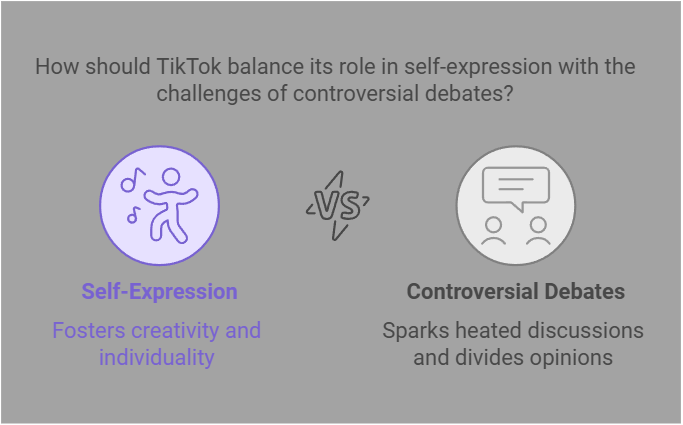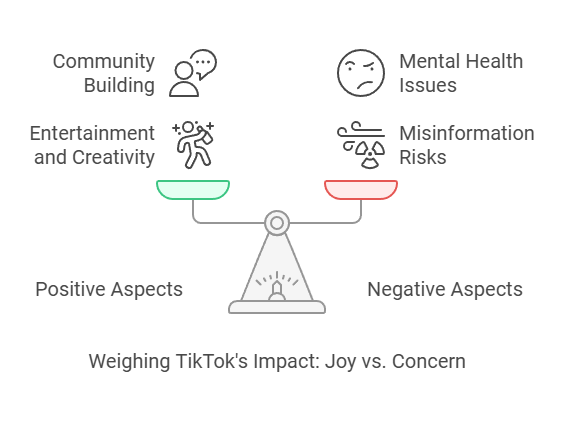Table of Contents
ToggleControverisla Argumens on Tiktok
Controverisla argumens on tiktok-TikTok, the viral social media platform, has become a space for creative expression, entertainment, and debates. However, like any platform that fosters open communication, TikTok is also home to controversial arguments that spark widespread attention. These debates often escalate, dividing users into passionate camps. In this article, we will explore some of the most controversial arguments on TikTok, focusing on notable examples that showcase the platform’s ability to amplify heated discussions.

The Power of Viral Debates on TikTok
TikTok’s unique algorithm, which pushes content to users based on their interests and engagement patterns, ensures that even niche arguments can gain massive visibility. What starts as a simple comment or video can rapidly spiral into a trending topic, attracting millions of viewers. Whether it’s a political issue, a societal debate, or a cultural controversy, TikTok’s format has given rise to various arguments that have left users divided.

Examples of Controversial TikTok Arguments
- The Debate on Cancel Culture
One of the most heated arguments on TikTok revolves around the concept of cancel culture. Supporters of cancel culture argue that it is an essential tool for holding public figures accountable for harmful actions or opinions. On the other hand, critics claim that cancel culture can be overzealous and lead to unjust punishments, sometimes without a fair investigation.
For example, in 2021, TikTokers were divided over the case of influencer James Charles, who faced allegations of inappropriate behavior. Some users supported his claims of innocence, while others pushed for accountability and criticized his past actions. This debate fueled the cancel culture discussion, with TikTok becoming a battleground for opposing views on whether people should be “canceled” or given a chance to grow and learn from their mistakes.
- Body Positivity vs. Health Concerns
The body positivity movement has been another controversial subject on TikTok. While many creators advocate for self-love and inclusivity, emphasizing that all body types should be celebrated, others argue that promoting extreme body types—whether it’s very slim or overweight—can be detrimental to people’s health.
One instance of this controversy occurred when TikTok user @chloe_t posted a video celebrating her body despite being overweight. While many people cheered her on for promoting self-acceptance, others argued that the focus should be on promoting healthier lifestyles rather than celebrating unhealthy habits. This argument continues to divide users, making it a prominent point of contention on the platform.
- Political Polarization and Misinformation
TikTok has also been a platform where political arguments become highly polarized. Misinformation spreads rapidly, and TikTok’s algorithm can amplify false claims, especially around contentious political issues. The debate about the COVID-19 pandemic is one such example, where some users spread misinformation about vaccines, masks, and public health policies.
For instance, a viral video featuring @DrJaneDoe, a medical professional, tried to debunk anti-vaccine conspiracy theories. However, the video faced strong opposition from individuals who believed the opposite. The ensuing argument became a significant example of how misinformation can spread quickly on TikTok, with both sides accusing each other of lying or manipulating facts.
- Cultural Appropriation and Sensitivity
Cultural appropriation has been another major source of debate on TikTok. Users often call out creators for allegedly appropriating other cultures for profit, which leads to intense arguments about the line between appreciation and appropriation. A famous example is the argument surrounding @charlidamelio, who was accused of appropriating African-American culture by performing dances that originated from Black creators.
While some users argued that TikTok is a platform for free expression and that dance styles are not tied to any one culture, others emphasized the importance of giving credit to those who originated the dances. The controversy triggered widespread discussions about race, respect, and intellectual property on TikTok, highlighting the complexities of cultural exchange in the digital age.
- Gender and Identity Politics
Gender identity has also been a divisive issue on TikTok, with users passionately debating topics like gender fluidity, pronouns, and transgender rights. TikTok has become a space where creators come out, share their personal experiences, and advocate for equality, which has sparked both support and criticism.
One particular example is the argument around @zoey_rae, a transgender TikTok user who posted a video about her transition. While many showed their support, others made hurtful comments challenging her gender identity. This led to an intense debate between those advocating for inclusivity and those who viewed her actions as controversial.
Why Are TikTok Arguments So Controversial?
Several factors contribute to the level of controversy that TikTok debates often reach:
- TikTok’s Algorithm: The “For You” page ensures that controversial content can gain massive exposure, even if it’s based on misinformation or inflammatory opinions.
- Anonymity: The ability to remain anonymous allows users to express their opinions freely, without fear of real-world consequences. This often leads to polarizing or extreme viewpoints.
- Youthful Demographic: With a large portion of TikTok’s user base being young people, many debates on the platform revolve around issues that are important to younger generations, including mental health, body image, and activism.
Conclusion
TikTok continues to be a place for debates on various topics, often amplifying controversial arguments to a larger audience. Whether it’s cancel culture, body positivity, political misinformation, or gender identity, TikTok users are quick to express their opinions, resulting in passionate discussions that can go viral. As the platform grows, we can expect more controversies to emerge, making TikTok an exciting yet divisive space in the world of social media.
Meta Description: Explore controversial arguments on TikTok with examples like cancel culture, body positivity, and political misinformation. Understand how TikTok amplifies heated debates.
5 FAQs
- What is cancel culture on TikTok? Cancel culture on TikTok involves the public calling out individuals for alleged harmful behavior or statements, leading to calls for accountability or “cancelling” the person involved.
- What are some examples of TikTok debates? Examples include arguments over cancel culture, body positivity vs. health concerns, political misinformation, cultural appropriation, and gender identity politics.
- How does TikTok’s algorithm influence controversial arguments? TikTok’s algorithm promotes viral content, which can cause even niche controversial debates to gain widespread attention, escalating arguments to a large audience.
- Is TikTok a platform for spreading misinformation? Yes, TikTok can sometimes amplify misinformation, particularly in political or health-related debates, due to its viral nature and easy content sharing.
- Why do body positivity movements spark arguments on TikTok? Body positivity on TikTok often leads to arguments because some users feel that promoting unhealthy body types undermines health, while others argue it promotes self-acceptance.
Hashtags: #TikTokDebates #CControversialArguments #ancelCulture #BodyPositivity #TikTokControversy

